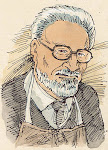… in the Minneapolis Star Tribune notes that the most charitable description of what’s been going on at the clubby University of Minnesota medical school would be “bizarre.”
Monday, August 23, 2010
How Clinical Trials Have Become Marketing Exercises
Making a Killing
From the Carlat Psychiatry Blog
(Promoting Honesty in Medical Education)
Daniel Carlat writes:
+++
Making a Killing
From the Carlat Psychiatry Blog
(Promoting Honesty in Medical Education)
Daniel Carlat writes:
There's a fascinating article by Carl Elliott in the current issue of Mother Jones. It's called "Making a Killing," and it shows how clinical trials have become marketing exercises for the pharmaceutical industry, sometimes at the expense of patients' lives. (You can read the article here, but you will need to complete a free registrations process).
The focus is on Astra Zeneca, maker of the antipsychotic Seroquel. Elliott tells the tragic story of Dan Markingson, a young man with schizophrenia who killed himself in a particularly gruesome way in May of 2004. At the time, Markingson was enrolled in an Astra Zeneca-funded study called the CAFE study. The acronym CAFE stands for "Comparison of Atypicals in First Episode of Psychosis." As the name implies, this study randomly assigned patients to three possible antipsychotics: Seroquel, Risperdal, and Zyprexa. The bottom line result, according the abstract in the American Journal of Psychiatry, was that the three drugs were equally effective.
Elliott acknowledges that there are risks in any clinical study. When the study is trying to answer a significant scientific questions, these risks may be reasonable. But when the study is designed to boost sales of a drug, these risks are very hard to defend.
As Elliott puts it: "It is one thing to ask people to take risks for science, or the common good, or to help other people. It is another thing entirely to ask them to risk their lives for the marketing goals of AstraZeneca."
I had read the CAFE study before, but as I was preparing this post, I noticed aspects of the design that had not struck me in the past. The study was truly manipulated in order to make Seroquel look good. In my next post I will delve into the specifics, so stay tuned.
+++
Subscribe to:
Post Comments (Atom)




No comments:
Post a Comment